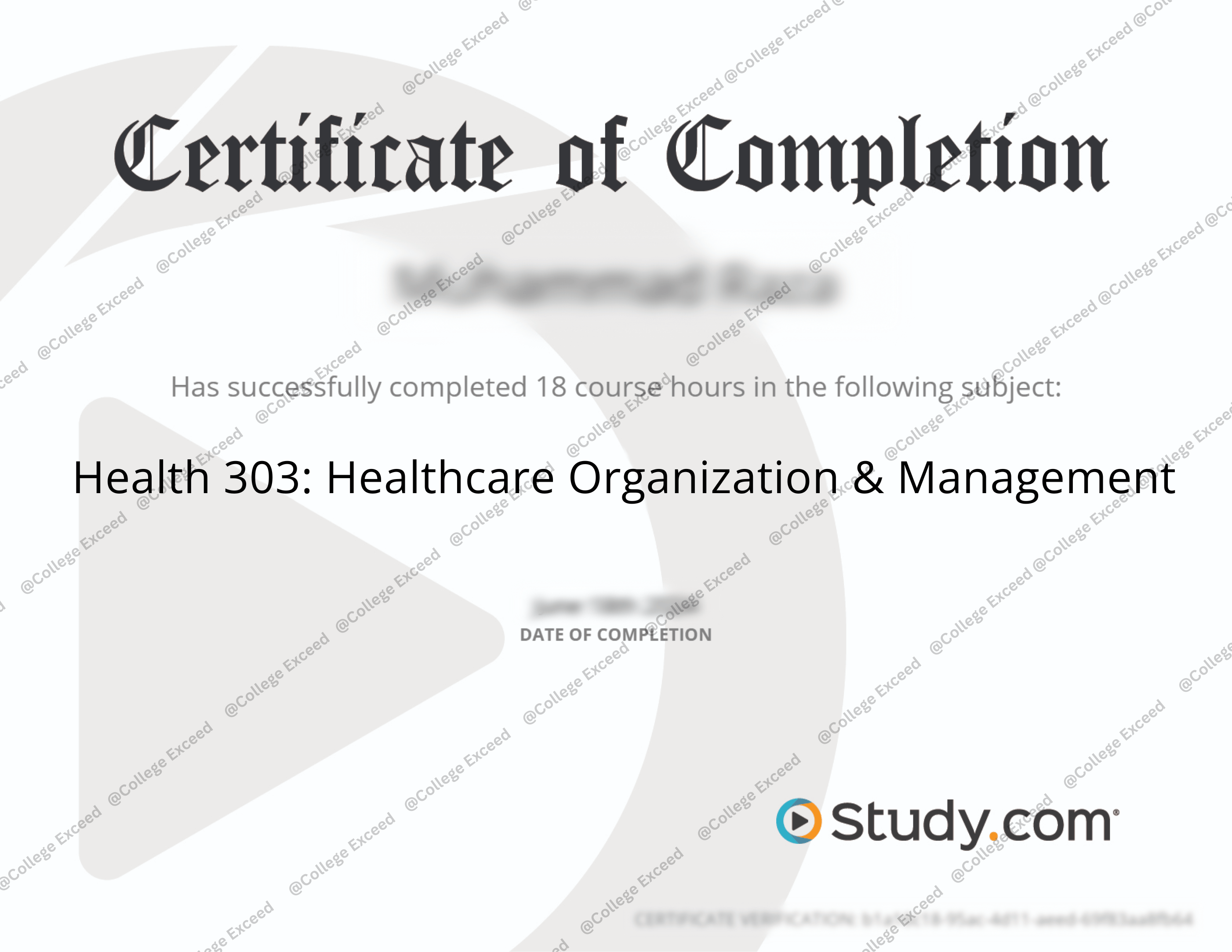
-
Gavin Walton
- October 19, 2024
Welcome to our article on study.com Health 303: Healthcare Organization & Management! If you’re here, it is likely that you are already considering yourself for the task to cover one of the most significant topics for any person, who is about to work in healthcare management. This course provides information that gives an in-depth view of the healthcare systems, the organization and management of healthcare facilities, and the leadership in the healthcare systems. So whether you want to be a hospital administrator and therefore need to gain as many credits as possible in the course or you simply want to excel in the course you are in the right place.
However, do not be bothered by this – this class does not in any way involve learning thousands, if not millions, of medical terms. However major concern is oriented to the identification of how healthcare organizations work, how decisions are made, and what laws and ethical concerns are involved. You might consider it as acquiring knowledge on how to manage the organization aspect of providing healthcare services as the patient gets the best services. Sounds interesting? Let’s get started!
---

What to Expect from Study.com Health 303 Class 📖
So, what’s study.com Health 303: Healthcare Organization & Management all about? Let’s break it down. The whole of this course is filled with the most important concepts that will serve as your strong background in healthcare management. In fact, with references and links to organizational structure and charts of how hospitals, clinics, and other healthcare organizations are being managed, it seems like pulling back a curtain. That’s why you will need to determine topics as diverse as legal concerns, healthcare marketing or even fiscal and personnel concerns. This category should be expected to teach the different management positions in the health care systems and leadership styles, the strategic and operational planning for the systems and organizations.
This course will especially focus on the four managerial activities famous as the management functions, namely: planning, organizing, leading, and controlling. Irrespective of the fact that these concepts are theoretical knowledge they are heavily weighted in the exam. It will be important for you to understand how healthcare managers apply these functions when setting objectives and delivering strategic decisions, particularly within stressful climates. The course also incorporates the aspect of teamwork in the health care delivery system, which is significant bearing in mind that teamwork determines the kind of care patients will receive and the productivity of the health care delivery system. Be ready to read materials regarding subjects such as evidence-based practice, which is the most effective approach to increasing patients’ quality of life, and how healthcare companies use information technologies to optimize their performance.
One thing to keep in mind: it should also be noted that this class is not just, for the most part, about the theory. Part and parcel of it are real-world applications. You will read the theoretical material and then step into case studies where you will see how these concepts really work, how healthcare strategic alliances are established, or how budgeting decisions affect patients’ treatment. Therefore, as you study leadership theories and quality improvement processes, the above facts will be associated with real-life healthcare situations, which will also be an aspect of your examination. Prepare for the best course, where the concepts of practical and theoretical knowledge will be blended in a way that you’ll never get bored!
Week-by-Week Study Plan to Ace Study.com Health 303 Exam📝
Okay, let us develop the easiest yet most effective study schedule that would ensure you dominate study.com Health 303: Healthcare Organization & Management. Here’s the week-by-week plan that will help you to be prepared and to go through the material confidently on the eve of the exam.
Week 1: Overview & Foundations
Start with the basics: get familiar with Chapter 1: Overview of Healthcare Management & Systems. This chapter lays the foundation, introducing you to healthcare management roles, U.S. healthcare systems, and important divisions. Spend time understanding the Affordable Care Act and healthcare reform as these are often heavily tested topics. Take a quiz or two on these concepts using Quizlet flashcards to help reinforce your memory.
- External Link: Affordable Care Act Explained
Week 2: Legal & Ethical Issues
Start with Chapters 2 & 3, topics include legal concerns and controversies of healthcare; and exploration of ethical concerns, i.e., HIPAA, fraud, and employment discrimination. This week dealt with the rather challenging issues concerning legal issues and ethical dilemmas of patient’s rights to privacy, medical malpractice, and consent. These topics can be dense, so look up videos or articles that simplify these concepts.
- External Link: HIPAA Law Overview
Week 3: Organizational Behavior & Management Functions
Time to explore Chapters 4 & 5, which cover organizational behavior and the core functions of management: Also called the managerial model it consists of planning, organizing, leading, and controlling. Do well to learn about some management theories such as Total Quality Management (TQM) and Six Sigma because they are expected to be part of the examination. Break down leader vs. manager characteristics and review leadership theories. Test your knowledge with some practice questions on leadership styles and functions of management.
- External Link: TQM vs Six Sigma
Week 4: Team Building & Leadership
For this week, review chapters 6 & 7. Emphasize the use of a variety of leadership positions, effective leadership characteristics, and how proper organizational healthcare teams could be developed. It is going to be wise for students to understand the difference between transformational and transaction leadership as leadership theory forms a significant part of the exam. Pay special attention to team-building methods in healthcare.
- External Link: Leadership in Healthcare
Week 5: Healthcare Planning & Strategy
Read study chapters 8 & 9 which give details concerning healthcare management activities, healthcare strategy, and planning for healthcare goals. While hearing the lecture, be familiar with the stages of planning and make sure to be acquainted with such tools as SWOT analysis and PESTLE. Doing case studies is inevitable by the end of the year since such strategic tools will definitely be useful Learning real-life examples will be a good experience.
- External Link: SWOT & PESTLE Analysis
Week 6: Managing Costs & Technology
Chapters 10 & 11 are due now: they are Management of Information Systems in Healthcare and Budget. This week is about knowing how healthcare organization applies technology as a way of reducing costs and improving operations. Burke explains the link between operating budgets & different methods of budgeting including zero & flexible budgeting.
- External Link: Budgeting Techniques Explained
Week 7: Quality Improvement & Human Resources
Go to Ch.12 & Ch.14. Health care management focuses on quality improvement and this section gives an understanding of how to undertake continuous improvement tools such as PDCA (Plan, do, check, act). You will also work on various aspects of human resources management in the healthcare sector such as recruitment, training, and employee evaluation. These topics are critical for managing healthcare teams effectively.
- External Link: PDCA Cycle in Healthcare
Week 8: Review & Practice Exams
This week is for review. Go back over any areas where you feel less confident, and take practice exams. This is also a great time to use study tools like Quizlet for flashcards and mock tests. Be sure to revisit any external links from previous weeks that you found helpful. The goal this week is to solidify your understanding and boost your confidence.
This will entrench you in a structured plan that will prepare you for the exam, better off than before. Panic is your biggest enemy so don’t stress yourself too much, ensure you take breaks and always organize yourself. You’ve got this!
---
Free External Resources to Study📂
YouTube Channels & Playlists
- Khan Academy – Healthcare
The educational videos on Khan Academy are great and so is their section on healthcare. If you have problems with material such as healthcare ethics or quality improvement, this channel has videos that explain them in the most uncomplicated way. - Healthcare Triage
This channel tackles complex healthcare topics in an engaging, relatable way. Their videos cover everything from health policy and insurance systems to public health and medical ethics. Perfect for deeper dives into topics covered in Health 303. - The HIPAA Guy
Not sure if it is HIPAA or if you are thinking about health privacy laws? Many explanations are detailed, and examples are given for such essential themes in this channel.
Articles & Blogs
- Health Affairs Blog
Health Affairs is a renowned journal, which is focused on the publication of articles discussing the matter of health policy, moral issues, and the field of healthcare as a whole. Their blog is great for those who need to find some articles about current events and trends in the sphere of healthcare, which can be helpful when putting the material into perspective. - The Healthcare Guys
If you are more concerned about the technological side of healthcare and how it is progressing then this blog has sections such as healthcare IT, telemedicine, and the future of healthcare. It’s a great place to explore how technology intersects with healthcare management.
Other Study Tools
- Medscape
Medscape offers free resources, including articles, case studies, and videos covering a wide range of healthcare topics. It’s particularly useful for learning more about healthcare systems and patient care strategies, topics central to Health 303. - OpenMD
For more in-depth research on healthcare topics, OpenMD is a free search engine that focuses on medical and healthcare literature. Use this resource to explore peer-reviewed articles and research papers.
---
Key Topics to Focus On🔑
To ace Study.com Health 303: Healthcare Organization & Management, it’s crucial to focus on the most challenging and essential topics. Here are four key concepts that will likely appear in your exam, along with simplified explanations, real-world examples, and comparisons to help you grasp them fully.
- Healthcare Systems: U.S. vs. Global Systems
Aspect | U.S. Healthcare System | Global Systems (e.g., UK, Canada) |
|---|---|---|
Cost | High out-of-pocket costs, insurance premiums | Funded largely through taxes, with lower out-of-pocket expenses |
Access | Unequal access, especially for uninsured individuals | Universal access through government programs |
Quality | High-quality care, but disparities in outcomes based on income | More equal health outcomes but may experience longer wait times. |
Insurance | Private insurance, Medicaid, Medicare | Public health insurance (e.g., NHS, single-payer systems) |
Real-world example: In the U.S., a person may pay significantly more for surgeries compared to someone in the UK who would receive similar care through the NHS at no direct cost.
- Leadership Styles in Healthcare
Leadership is key to healthcare management, and different styles can have varying impacts on how a team operates.
Style | Description | Best For | Example |
|---|---|---|---|
Transformational | Inspires employees to transcend personal goals for the organization’s success | Encouraging innovation and change | A hospital leader inspiring staff to adopt new technology. |
Democratic | Values input from team members and encourages participation. | Situations where collaboration is needed | A nursing director who holds regular meetings to gather team input |
Autocratic | Centralized control with little input from staff | Emergency situations where quick, decisive action is needed | A leader taking charge during a medical crisis |
Pro tip: Leadership styles like transformational leadership are often tested in exams, so focus on understanding which situations call for each style.
- HIPAA Compliance vs. Patient Confidentiality
Aspect | HIPAA Compliance | Patient Confidentiality |
|---|---|---|
Purpose | To protect patient health information (PHI) under U.S. law | An ethical obligation for healthcare providers to maintain privacy |
Application | Federally mandated; breaches can result in penalties. | Ethical principles, often broader than HIPAA regulations |
Examples | Sharing PHI without patient consent is a violation of HIPAA. | Discussing patient info in a public space violates confidentiality |
Exam Tip: HIPAA-related questions are common. Make sure you can differentiate between legal obligations under HIPAA and ethical obligations of patient confidentiality.
- Continuous Quality Improvement (CQI) vs. Total Quality Management (TQM)
Aspect | CQI | TQM |
|---|---|---|
Focus | Ongoing improvement of processes | Holistic improvement across all aspects of the organization |
Approach | Involves small, incremental changes | A company-wide focus on customer satisfaction and quality |
Method | Utilizes the PDCA (Plan, Do, Check, Act) cycle | Emphasizes teamwork, continuous improvement, and customer focus |
Example | Regularly improving patient wait times in an ER | A hospital-wide initiative to improve patient satisfaction scores |
Understanding the nuances between similar concepts like CQI and TQM can boost your exam performance, so take time to compare and contrast them.
These key topics are essential to grasp for Study.com Health 303: Healthcare Organization & Management, and having a clear understanding of these concepts will help you excel in the exam. Make sure to spend extra time on these areas, as they’re often tested in various ways!
---
Study.com Health 303 FAQ❓
Q1: How hard is Health 303?
A: The difficulty depends on your background in healthcare, but with consistent study, it’s manageable. Following the study plan and using practice quizzes will make it easier.
Q2: Which chapters should I focus on the most?
A: Chapters on healthcare systems, leadership, legal issues, and quality improvement are critical. These topics tend to appear more frequently in exams.
Q3: What types of questions will be on the exam?
A: Expect a mix of multiple-choice, short-answer, and scenario-based questions. Understanding both definitions and real-world applications is key.
Q4: Do I need to memorize all the healthcare laws and policies?
A: Focus on understanding key laws like HIPAA and their real-world impact. Memorization is helpful, but applying the concepts is more important.
Q5: Is the exam open-book?
A: Exams are proctored, so it’s best to be fully prepared without relying on open-book options. Use flashcards and other resources for efficient review.
Q6: Can I retake quizzes and exams if I don’t pass?
A: Yes, retakes are allowed, but check the course policy for specific limits. Use the feedback from failed attempts to improve before retaking.
---
Conclusion 📄
Health 303: Healthcare Organization & Management is a great option for learners who seek to know more about the healthcare sector. This class provides the fundamental knowledge of strategic management and its application in healthcare management by virtue of its concentration on legal and ethical factors, leadership, and quality improvement. Therefore, obtaining a good study timetable coupled with utilization of free outside resources makes the passing of this exam very much possible. Always be in a position to relate with the content, keep the motivation on, and employ the study skills and strategies that have been expounded in detail so as to benefit from the course as much as possible. You have it; all you have to do is to start walking through the process one step at a time!



